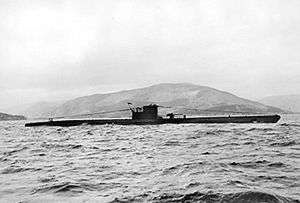German submarine U-974
German submarine U-974 was a Type VIIC U-boat of Nazi Germany's Kriegsmarine during World War II.
 U-570 Type VIIC submarine that was captured by the British in 1941. This U-boat is almost identical to U-974. | |
| History | |
|---|---|
| Name: | U-974 |
| Ordered: | 5 June 1941 |
| Builder: | Blohm & Voss, Hamburg |
| Yard number: | 174 |
| Laid down: | 26 June 1942 |
| Launched: | 11 March 1943 |
| Commissioned: | 22 April 1943 |
| Fate: | Sunk on 19 April 1944 |
| General characteristics | |
| Class and type: | Type VIIC submarine |
| Displacement: |
|
| Length: |
|
| Beam: |
|
| Height: | 9.60 m (31 ft 6 in) |
| Draught: | 4.74 m (15 ft 7 in) |
| Installed power: |
|
| Propulsion: |
|
| Speed: |
|
| Range: | |
| Test depth: |
|
| Complement: | 4 officers, 44–52 enlisted |
| Armament: |
|
| Service record | |
| Part of: |
|
| Commanders: | |
| Operations: | 1 patrol |
| Victories: | None |
She was ordered on 5 June 1941, and was laid down on 26 June 1942 at Blohm & Voss, Hamburg, as yard number 174. She was launched on 11 March 1943 and commissioned under the command of Oberleutnant zur See Joachim Zaubitzer on 22 April 1943.[3]
Design
German Type VIIC submarines were preceded by the shorter Type VIIB submarines. U-974 had a displacement of 769 tonnes (757 long tons) when at the surface and 871 tonnes (857 long tons) while submerged.[4] She had a total length of 67.10 m (220 ft 2 in), a pressure hull length of 50.50 m (165 ft 8 in), a beam of 6.20 m (20 ft 4 in), a height of 9.60 m (31 ft 6 in), and a draught of 4.74 m (15 ft 7 in). The submarine was powered by two Germaniawerft F46 four-stroke, six-cylinder supercharged diesel engines producing a total of 2,800 to 3,200 metric horsepower (2,060 to 2,350 kW; 2,760 to 3,160 shp) for use while surfaced, two Garbe, Lahmeyer & Co. RP 137/c double-acting electric motors producing a total of 750 metric horsepower (550 kW; 740 shp) for use while submerged. She had two shafts and two 1.23 m (4 ft) propellers. The boat was capable of operating at depths of up to 230 metres (750 ft).[4]
The submarine had a maximum surface speed of 17.7 knots (32.8 km/h; 20.4 mph) and a maximum submerged speed of 7.6 knots (14.1 km/h; 8.7 mph).[4] When submerged, the boat could operate for 80 nautical miles (150 km; 92 mi) at 4 knots (7.4 km/h; 4.6 mph); when surfaced, she could travel 8,500 nautical miles (15,700 km; 9,800 mi) at 10 knots (19 km/h; 12 mph). U-974 was fitted with five 53.3 cm (21 in) torpedo tubes (four fitted at the bow and one at the stern), fourteen torpedoes or 26 TMA mines, one 8.8 cm (3.46 in) SK C/35 naval gun, 220 rounds, and one twin 2 cm (0.79 in) C/30 anti-aircraft gun. The boat had a complement of between 44 — 52 men.[4]
Service history
On 19 June 1944, U-974 was sunk by torpedoes near Stavanger, Norway, in the Boknafjord. U-974 was attacked by a Norwegian submarine, Ula. Eight of the crew of fifty survived.[3]
The wreck is located at 59°08′N 05°23′E.[3]
Discovery of wreck
In 1996, an ROV at a depth of about 190 m (620 ft) discovered the wreck of U-974. She had broken into two separate parts of about 15 m (49 ft) and 40 m (130 ft) in length. The wreck of U-974 lies around 1,000 m (3,300 ft) southeast of Løten.[3]
References
- Helgason, Guðmundur. "Joachim Zaubitzer". German U-boats of WWII - uboat.net. Retrieved 8 April 2016.
- Helgason, Guðmundur. "Heinz Wolff". German U-boats of WWII - uboat.net. Retrieved 8 April 2016.
- Helgason, Guðmundur. "U-974". German U-boats of WWII - uboat.net. Retrieved 7 April 2016.
- Gröner 1991, pp. 43-46.
Bibliography
- Busch, Rainer; Röll, Hans-Joachim (1999). German U-boat commanders of World War II : a biographical dictionary. Translated by Brooks, Geoffrey. London, Annapolis, Md: Greenhill Books, Naval Institute Press. ISBN 1-55750-186-6.CS1 maint: ref=harv (link)
- Busch, Rainer; Röll, Hans-Joachim (1999). Deutsche U-Boot-Verluste von September 1939 bis Mai 1945 [German U-boat losses from September 1939 to May 1945]. Der U-Boot-Krieg (in German). IV. Hamburg, Berlin, Bonn: Mittler. ISBN 3-8132-0514-2.CS1 maint: ref=harv (link)
- Gröner, Erich; Jung, Dieter; Maass, Martin (1991). U-boats and Mine Warfare Vessels. German Warships 1815–1945. 2. Translated by Thomas, Keith; Magowan, Rachel. London: Conway Maritime Press. ISBN 0-85177-593-4.
External links
- Helgason, Guðmundur. "Patrols by U-974". German U-boats of WWII - uboat.net.